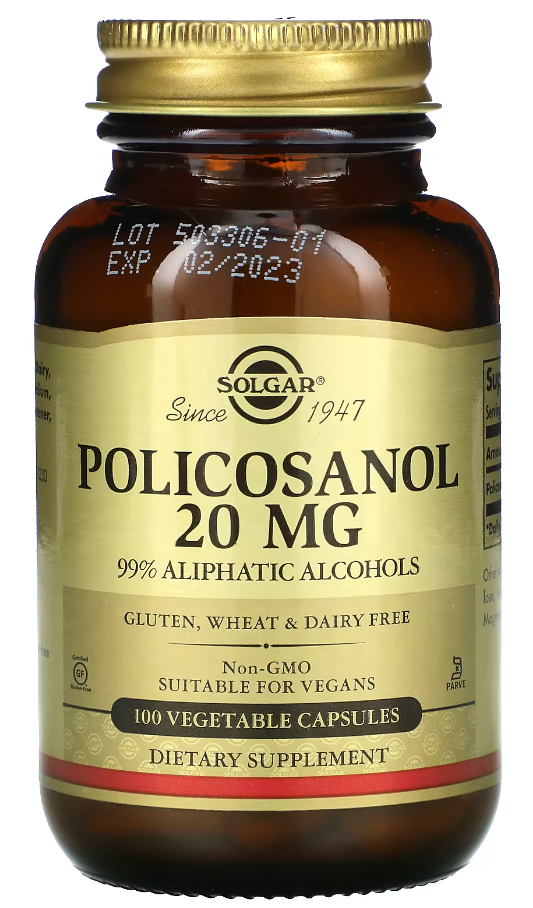Policosanol is often claimed to help lower cholesterol (regulate blood lipid levels), antiviral activity, reduce prostate enlargement, relieve intermittent claudication, and is one of the fastest selling over-the-counter supplements
In empirical medicine, what are the benefits of Policosanol? Are there any side effects of Policosanol? See text analysis for details
What is Policosanol?
Policosanol is a term originally used to refer to a mixture of fat-soluble compounds extracted from the waxy coating of Cuban sucrose, and the first Policosanol supplements were isolated and produced in the early 90s by researchers at Cuba’s Dalmer laboratory.
Currently, Policosanol can also be prepared from other sources, including beeswax, wheat, sorghum, corn, rice, cauliflower, spinach, alfalfa, rice bran and other grains.
Its main component is very long-chain saturated fatty alcohols, including approximately 66% octacosanol, 12% tricosanol, 7% hexanol and a lower proportion of other alcohols, including docosakanol and docosacosanol.
What are the empirical benefits of Policosanol?
1.Policosanol is beneficial to blood lipid regulation
Dyslipidemia, including LDL cholesterol ≥130 mg/dL, total cholesterol ≥200 mg/dL and triglycerides ≥150 mg/dL, or HDL cholesterol <40 mg/dL (men) and <50 mg/dL (women), is one of the main risk factors for coronary heart disease and stroke.
Ingredients that can be used to treat dyslipidemia include HMG-CoA reductase inhibitors (statins) and a variety of non-statins, including bile acid isolates, cholesterol absorption inhibitors, fibroic acid, nicotinic acid, and omega-3 fatty acids.
A meta-analysis (22 randomized controlled trials with 1886 dyslipidemia participants) showed that compared with placebo, sucragen (especially a daily dose of 5 mg) reduced total cholesterol and low-density lipoprotein cholesterol and raised high-density lipoprotein cholesterol density lipoprotein cholesterol), but no significant effect on triglyceride and body weight. Note 1
The mechanism behind it is related to its reduction of HMG-CoA reductase activity and increase of AMPK enzyme activity.
*Conclusion: Policosanol may have a positive effect on blood lipid regulation, but due to the high heterogeneity of the included studies, more high-quality clinical trials are needed for further validation
2.Policosanol is beneficial to blood pressure regulation
Hypertension is a major risk factor for cardiovascular disease, associated with about 70% of chronic heart failure, stroke, and heart attacks
With an estimated 33% of healthy adults having high blood pressure, and a 2 mm Hg reduction in systolic blood pressure and a 1 mm Hg reduction in diastolic blood pressure is associated with an approximately 10% reduction in cardiovascular risk, primary prevention of hypertension is a priority for the healthcare system.
A systematic literature review and meta-analysis (19 randomized controlled trials, 2289 participants) suggested that gluqualin supplementation (daily doses between 5 mg and 20 mg) significantly reduced systolic (-3.423 mmHg) and diastolic (-1.468 mmHg). Note 2
In addition, subgroup analysis showed significant results in all subgroups except those with dyslipidemia and blood pressure and those who were overweight.
The mechanism behind it is related to its activation of activated protein kinase (AMPK), inhibition of glycosylation and oxidation, improvement of arterial endothelial cell function, inhibition of platelet aggregation and thrombosis, and reduction of aldosterone release.
*Conclusion: Policosanol supplementation may have a positive effect on blood pressure regulation, but due to the high heterogeneity of the included studies, more studies are needed to confirm its clinical benefit
3.Policosanol is beneficial for intermittent claudication
Intermittent claudication is a symptom of atherosclerosis of the lower extremities (peripheral arterial disease) characterized by muscle pain and cramps in the lower extremities during exercise.
Patients with intermittent claudication do not feel any discomfort at rest because blood flow and oxygen supply to the extremities are replenished. During exercise, narrowing or occlusion of the arteries that supply the muscles of the lower extremities limits the necessary increase in blood flow, resulting in an imbalance between metabolic demand and oxygen supply and is associated with the occurrence of claudication.
Intermittent claudication limits the ability to walk and makes it difficult for patients to participate actively in personal, social and professional life, which is one of the causes of disability in middle-aged and elderly people.
A randomized placebo-controlled trial (2-year in 56 patients with intermittent claudication) showed significant improvements in initial claudication, absolute claudication distance, ankle/arm pressure index, and lower extremity symptoms. Note 3
*Conclusion: For intermittent claudication, oral policosanol may have a positive effect on disease improvement, but limited by small sample sizes, more studies are needed to support this
Are there any side effects of Policosanol?
As far as the limited studies have been concerned, oral doses of 5 to 80 mg for 3 years have been found to be probably safe for most people.
However, possible side effects or adverse effects that have been reported include fatigue, headache, insomnia, dizziness, bleeding nose or gums, stomach upset, rash, excessive urination, or weight loss.
Safety precautions (4 contraindications to use)
1. Do not use if pregnant or lactating women (due to unknown safety)
2. Patients with poor coagulation function or taking anticoagulant/antiplatelet drugs should not use, because sucraterin also has anticoagulant effect, related drug names are: aspirin, clopidogrel, diclofenac, ibuprofen, naproxen, dalteparin (dalteparin sodium), Enoxaparin, heparin, warfarin
3. Discontinuation of use at least 2 weeks before scheduled surgery may increase the chance of additional bleeding during and after surgery (due to the anticoagulant effect of incraterin)
4. Patients with hypotension or taking blood pressure lowering drugs should not be used, because sucramine may have blood pressure lowering effect
Where can I buy the highest quality Policosanol that is recommended by most people?
| Solgar, Policosanol, 20 mg, 100 Vegetable Capsules (Direct shipping from the United States / Worldwide delivery) |
Product Features: Solgar is a veteran health care product manufacturer founded in the United States with a history of more than 60 years, known for its high quality, and has a very high sales and repurchase rate on major shopping websites 99% aliphatic alcohols Non-GMO Gluten-free | |

